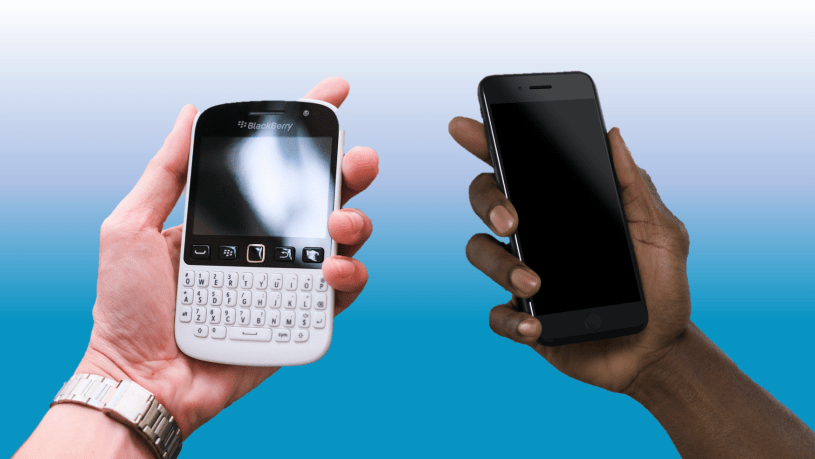Do you remember a time when you didn’t have the world at your fingertips? Where you weren’t able to seamlessly navigate text messages, the internet, games, and more on a small device? I barely do…
Although it may not feel like it, that time was less than 20 years ago. Today’s teenagers don’t remember a life without the iPhone. But to those of us who are just a bit older, we can also recall another once-ubiquitous cellular device — the BlackBerry. Arguably the two most revolutionary handheld devices in history, the BlackBerry and the iPhone have an interesting relationship, as the latter’s ascendance ushered in the former’s demise. In today’s issue of Word Wars, we’re going to explore this relationship – at least when it comes to how often, where, and even why people search for these devices.
A bit of background: the BlackBerry debuted its first phone in 2002, and we can assume it had the run of the Google Search mill (unfortunately, Google Trends don’t show data from before 2004, so we aren’t able to confirm that…). Approximately seven years later in January 2009, the first iPhone was introduced.
When looking at search trends from January 1, 2004 to January 1, 2010 shown in the chart below, it’s interesting to note that even when they were leading the market, BlackBerry searches (blue) never reached the same peak as iPhone searches (red). Reasoning behind this may be the revolutionary and consumer-friendly nature of the iPhone, but that’s not to say the BlackBerry wasn’t revolutionary in its time once too.
Once the iPhone hits the market in 2007, it typically takes the lead, although both BlackBerry and iPhone experience spikes in searches, which can be attributed to various new version launches. In November 2008, the two lines meet again. Taking a closer look at the product launches in and around that month, we see that BlackBerry debuted its first touchscreen model, chasing after a popular aspect of its competitor (this occurred a few months after Apple continued its device advancement with the release of the iPhone 3G). As shown below, the two lines play leap frog throughout the month of November.
The tension in this chart is palpable. The iPhone, just two years old, but oh so popular, attempts to fend off a competitor and retain its spot atop the mobile phone search volume standings. The BlackBerry, displaced after years of market dominance, finally caves in to the pressure and introduces a touchscreen… but will it be enough? Over the month, the two are locked in a seesaw battle. Only with the benefit of hindsight can we know what we do: While BlackBerry eked out a tie in November 2008, its popularity would prove to be fleeting. In no month since then has it been in the competition for the top spot.
Returning our focus to that tension-filled month of November 2008, let’s zoom out to the national map, shown below. It is surprising, while the country’s search volume was evenly split between the two smartphones, a clear majority of states are searching for BlackBerry more than they are for iPhone (particularly since we noted above that BlackBerry’s search peaks don’t pass those of the iPhone for years). Interestingly, BlackBerry won 40 out of 50 states, but the heft of California, Texas, and New York helped iPhone maintain a tie.
North and South Dakotans seem to have found BlackBerry particularly interesting, as 82% and 81% of searches for “iPhone” or “Blackberry”were concentrated on the latter. One thought I had to explain this difference may be the average income in the Dakotas versus, say, California or New York, where the percentage of “iPhone” searches was dramatically higher. iPhones are notoriously known for being expensive, more so than any other cell phone on the market, so income likely has an impact on what phone sparks the interest of consumers across the different economic classes. But in 2008, their price points were quite comparable.
(Editor’s Note: There is a Blackberry Trail in South Dakota, and it’s reasonable to wonder if searches for the trail are impacting our analysis. It’s hard to say. On one hand, no trail-related search terms are flagged by Google; i.e. Google tells us that people in North Dakota were searching for “blackberry storm,” but mentions nothing about searches for “blackberry trail.” On the other hand, it seems like an oddly convenient coincidence that the four states most likely to search for “Blackberry” — as compared with iPhone — are South Dakota itself as well as three states that border it: North Dakota, Wyoming and Montana.)
In the end, I guess it really doesn’t matter who searched for BlackBerry versus iPhone, where they were located, etc., because at the end of the day BlackBerry is no more. In January of this year, the company decommissioned its legacy software, meaning all original devices that are out there in the world no longer function.
It’s hard to imagine a world without the iPhone, though, so I leave you with one final question – if you could only have either a BlackBerry or an iPhone for the rest of your life, what would you go with?
